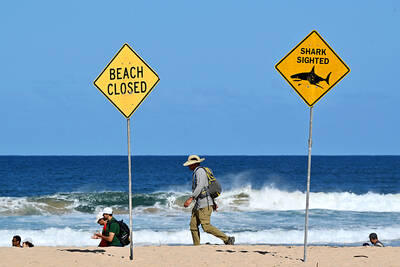US Army General Mark Milley on Tuesday told the US Congress that he knew former US president Donald Trump was not planning to attack China and that it was his job to reassure the Chinese of this in telephone calls.
Milley, who is chairman of the Joint Chiefs of Staff, defended the two calls he made to his Chinese counterpart, saying that he was responding to a “significant degree of intelligence” that China was worried about a US attack.
“I know, I am certain, that President Trump did not intend to attack the Chinese... And it was my directed responsibility by the secretary to convey that intent to the Chinese,” Milley told the Senate Armed Services Committee in Washington. “My task at that time was to de-escalate. My message again was consistent: Stay calm, steady and de-escalate. We are not going to attack you.”

Photo: AP
Milley has been at the center of controversy after reports that he made two calls to Chinese People’s Liberation Army General Li Zuocheng (李作成) to assure him that the US was not suddenly going to go to war with or attack China.
Details of the calls were first aired in excerpts from the recently released book Peril by Washington Post journalists Bob Woodward and Robert Costa.
While Tuesday’s hearing largely focused on the troop withdrawal from Afghanistan and the chaotic evacuation of Americans, Afghans and others from the country, a few senators condemned Milley for what they saw as inappropriate communications with Li.
In his most extensive comments to date on the matter, Milley said the calls on Oct. 30 last year and Jan. 8 were fully coordinated with the defense secretaries at the time as well as other US national security agencies.
Such military-to-military communications are critical to prevent war between great powers that possess nuclear weapons, he said.
Milley said the October call was made at the direction of then-US secretary of defense Mark Esper, and the second was done at the request of the Chinese and coordinated with then-acting US secretary of defense Chris Miller’s office.
Asked if he spoke with the book’s authors and if his remarks were “accurately represented,” Milley said he spoke with Woodward and that he has not read the book, but has seen press reports on it.
Milley also addressed a call he received from US House of Representatives Speaker Nancy Pelosi.
Pelosi “called me to inquire about the president’s ability to launch nuclear weapons,” he said. “I sought to assure her that nuclear launch is governed by a very specific and deliberate process.”
He said he assured her that while the president is the sole nuclear launch authority, “he doesn’t launch them alone.”
“There is no chance of an illegal, unauthorized or accidental launch,” Milley said.
The book says that during the call, Milley agreed with Pelosi’s statement that Trump was suffering a mental decline after his election loss.
During Tuesday’s hearing, Milley appeared to discount that, saying: “I am not qualified to determine the mental health of the president of the United States.”
“At no time was I attempting to change or influence the process, usurp authority or insert myself in the chain of command, but I am expected, I am required, to give my advice and ensure that the president is fully informed,” Milley said.

With much pomp and circumstance, Cairo is today to inaugurate the long-awaited Grand Egyptian Museum (GEM), widely presented as the crowning jewel on authorities’ efforts to overhaul the country’s vital tourism industry. With a panoramic view of the Giza pyramids plateau, the museum houses thousands of artifacts spanning more than 5,000 years of Egyptian antiquity at a whopping cost of more than US$1 billion. More than two decades in the making, the ultra-modern museum anticipates 5 million visitors annually, with never-before-seen relics on display. In the run-up to the grand opening, Egyptian media and official statements have hailed the “historic moment,” describing the

SECRETIVE SECT: Tetsuya Yamagami was said to have held a grudge against the Unification Church for bankrupting his family after his mother donated about ¥100m The gunman accused of killing former Japanese prime minister Shinzo Abe yesterday pleaded guilty, three years after the assassination in broad daylight shocked the world. The slaying forced a reckoning in a nation with little experience of gun violence, and ignited scrutiny of alleged ties between prominent conservative lawmakers and a secretive sect, the Unification Church. “Everything is true,” Tetsuya Yamagami said at a court in the western city of Nara, admitting to murdering the nation’s longest-serving leader in July 2022. The 45-year-old was led into the room by four security officials. When the judge asked him to state his name, Yamagami, who

DEADLY PREDATORS: In New South Wales, smart drumlines — anchored buoys with baited hooks — send an alert when a shark bites, allowing the sharks to be tagged High above Sydney’s beaches, drones seek one of the world’s deadliest predators, scanning for the flick of a tail, the swish of a fin or a shadow slipping through the swell. Australia’s oceans are teeming with sharks, with great whites topping the list of species that might fatally chomp a human. Undeterred, Australians flock to the sea in huge numbers — with a survey last year showing that nearly two-thirds of the population made a total of 650 million coastal visits in a single year. Many beach lovers accept the risks. When a shark killed surfer Mercury Psillakis off a northern Sydney beach last

‘CHILD PORNOGRAPHY’: The doll on Shein’s Web site measure about 80cm in height, and it was holding a teddy bear in a photo published by a daily newspaper France’s anti-fraud unit on Saturday said it had reported Asian e-commerce giant Shein (希音) for selling what it described as “sex dolls with a childlike appearance.” The French Directorate General for Competition, Consumer Affairs and Fraud Control (DGCCRF) said in a statement that the “description and categorization” of the items on Shein’s Web site “make it difficult to doubt the child pornography nature of the content.” Shortly after the statement, Shein announced that the dolls in question had been withdrawn from its platform and that it had launched an internal inquiry. On its Web site, Le Parisien daily published a